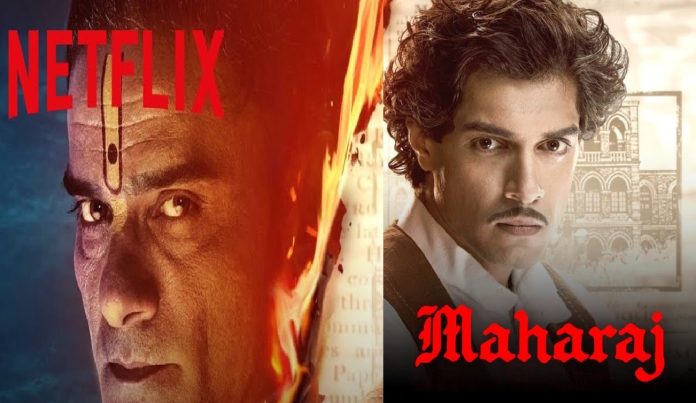Yash Raj Films’ Maharaj is based on the Maharaj libel case of 1862.
Yadunath Maharaj (Jaideep Ahlawat), a Hindu temple priest, misuses his position and sexually exploits young girls in the name of religion in Vadaal (Gujarat). Karsan (Junaid Khan) is a journalist and decides to expose the lecherous priest when his own fiancée, Kishori (Shalini Pandey), is sexually exploited by him. At first over-confident, Maharaj soon realises that the tide is turning against him. That’s when he files a libel case against Karsan. A British judge rules in favour of Karsan, spelling defeat for Maharaj.
The film is based on a Gujarati book of the same name, written by Saurabh Shah. The story is bold inasmuch as it exposes the sexual escapades of a religious head. However, one has seen and heard stories of several sexually crazy Godmen in modern times to be shocked by the deeds of the temple priest in 1862. In that sense, the story and screenplay adapted by Vipul Mehta and additional screenplay by Sneha Desai do not impress the viewers. After a point of time, the drama becomes repetitive. The audience fails to sympathise with Kishori because she agrees to surrender her body to the temple priest even after Karsan pleads with her to not be blinded by religious beliefs. The drama may be based on factual incidents and events but it fails to emotionally move the viewers because of the manner in which it is written. Besides, Karsan’s fight against the temple priest lacks fire. It is for this reason that the audience do not experience the exhilaration they should when Karsan wins the libel case. Another reason for the lack of vindication, so to say, is the fact that the girls were themselves willing to be exploited by the priest — they did not have to be forced for it by the priest or his men. As mentioned earlier, the drama may be based on reality but there may not be many takers for such reality more than 160 years later. The appearance of Karsan’s aunt in the court to support him also does not have the desired effect, if only because one fails to understand why she was against his stand earlier. It is not as if she had just realised that she, too, was sexually exploited. Yes, the girls/ladies were all blinded by religious beliefs but for the viewers today to empathise with such women may not be possible because times have changed. All in all, Vipul Mehta and Sneha Desai have not been able to mentally transport the audience to an era gone by. Sneha Desai’s dialogues are ordinary.
Junaid Khan makes an average debut as Karsan. He needs to get into the skin of the character if he is to make an impact on the viewers. Shalini Pandey is impressive as Kishori. In a special appearance, Sharvari performs ably as the bubbly Viraaj. Her free acting is entertaining. Jaideep Ahlawat is not too impressive. In fact, he hardly acts, letting his arrogant smile and cool confidence do the talking, but they don’t work too well. Sanjeev Seth and Jaya Ojha are adequate as Karsan’s maternal uncle and aunt. Rudrakshi Gupta and Jyoti Gauba lend fair support as Kishori’s mother and maternal aunt respectively. Utkarsh Mazumdar makes his mark as senior priest Lalwanji Maharaj. Sneha Desai makes her presence felt as Bhabhu. Jai Upadhyay (as Giridhar Khawas), Viraf Patel (as Sohrabji), Dharmendra Gohil (as Tejpal), Sanjay Goradia (as Nanubhai), Meher Vij (as Vahuji), Priyal Gor (as Leelavati), Kamlesh Oza (as Shyamji), Edward Sonnenblick (as Justice Sausse), Sunil Gupta (as Dadabhai Naoroji), Ananya Agarwal (as Devi), Vaibhav Tatwawadi (as Bhaudaji Lad), Sandeep Mehta (as Muljibhai), Rasik Dave (as Pranjivanbhai), Jyoti Mukerji (as Rajniben), Pradeep Shukla (as Mukhiyaji), Jiten Mukhi (as Kaka), Vansh Sayani (as young Karsan), Vidhaan Sharma (as 6-year-old Karsan), Sonali Nanavati (as Karsan’s grandmother), Aditya Shah (as Karsan’s friend), Dharna Gupta (as Yadunath Maharaj’s maid) and the others provide routine support.
Siddharth P. Malhotra’s direction is ordinary. He has not been able to make his characters come truly alive. Sohail Sen’s music is average. Kausar Munir’s lyrics are alright. Vaibhavi Merchant’s choreography is eye-pleasing. Sanchit Balhara and Ankit Balhara’s background music is reasonably nice. Rajeev Ravi’s cinematography is superb. Subrata Chakraborty and Amit Ray’s production designing is excellent. Shweta Venkat Mathew’s editing should’ve been tighter.
On the whole, Maharaj is neither exciting nor entertaining nor even engaging. It will go down in OTT history as just another digital film.
Released on 21-6-’24 on Netflix.





























